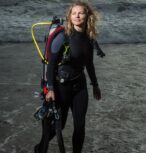DNA reveals the past and future of coral reefs
New DNA techniques are being used to understand how coral reacted to the end of the last ice age in order to better predict how they will cope with current changes to the climate. James Cook Univer

From 2005 to 2022, the main node of the ARC Centre of Excellence for Coral Reef Studies was headquartered at James Cook University in Townsville, Queensland (Australia)








Abstract:
How can we care about something we never see or experience? Virtual reality has the potential to connect people with far-away places, and is an effective medium to generate empathy and self-efficacy towards environmental issues. Further, photogrammetry and 3D digitization is an effective tool for research, historic preservation, and science learning. In this seminar, Dr. Woolsey will share her work in virtual immersion, science communication, and design. Her organization – the Hydrous – has led over 300,000 virtual dives, curated hundreds of coral colonies and museum specimens, and developed accessible methods of ocean science learning amidst the global pandemic. To join a virtual dive during this seminar, have your smart phone ready and the YouTube app installed.
Biography:
Erika is a marine biologist, designer, virtual reality filmmaker, National Geographic Explorer, Visiting Scholar at the Stanford University Virtual Human Interaction Lab, and CEO and co-founder of The Hydrous, a non-profit devoted to translating marine science into public understanding. She received her PhD from the Centre of Excellence for Coral Reef Studies at James Cook University in 2014, and was advised by Prof. Andrew Baird, Dr. Sally Keith, and Prof. Maria Byrne. She earned her Masters of Applied Science in Coastal Management from the University of Sydney and studied biology and art history at Duke University. She was a 2018-2019 Ocean Design Fellow at the Stanford University Hasso Plattner Instituted of Design (the d.school) and the Stanford Center for Ocean Solutions. She has taught human-centered design at Stanford and Harvard Universities, and consults for Fortune 500 companies on non-ocean-related issues.
New DNA techniques are being used to understand how coral reacted to the end of the last ice age in order to better predict how they will cope with current changes to the climate. James Cook Univer
A new study on the effects of climate change in five tropical countries has found fisheries are in more trouble than agriculture, and poor people are in the most danger. Distinguished Profess
James Cook University researchers have found brightly coloured fish are becoming increasingly rare as coral declines, with the phenomenon likely to get worse in the future. Christopher Hemingson, a
Researchers working with stakeholders in the Great Barrier Reef region have come up with ideas on how groups responsible for looking after the reef can operate more effectively when the next bleaching
Abstract: As marine species adapt to climate change, their heat tolerance will likely be under strong selection. Individual variation in heat tolerance and its heritability underpin the potential fo
Abstract: The Reef Ecology Lab in KAUST’s Red Sea Research Center explores many aspects of movement ecology of marine organisms, ranging from adult migrations to intergenerational larval dispersal
Abstract: Macroalgal meadows are a prominent, yet often maligned component of the tropical seascape. Our work at Ningaloo reef in WA demonstrate that canopy forming macroalgae provide habitat for ad
Abstract: Sharks are generally perceived as strong and fearsome animals. With fossils dating back at least 420 million years, sharks are not only majestic top predators but they also outlived dinosa
Abstract: Connectivity plays a vital role in many ecosystems through its effects on fundamental ecological and evolutionary processes. Its consequences for populations and metapopulations have been
Abstract: Evolution of many eukaryotic organisms is affected by interactions with microbes. Microbial symbioses can ultimately reflect host’s diet, habitat range, and even body shape. However, how
Abstract: The past few years have seen unprecedented coral bleaching and mortality on the Great Barrier Reef (GBR) but the consequences of this on biodiversity are not yet known. This talk will expl